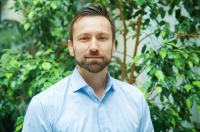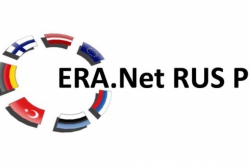— Evgeny, could you tell us about the grant you received?
I got the grant from the European Research Council (ERC). Their grants are considered the most prestigious in Europe. When distributing grants, ERC looks at one's excellence only: you have to meet certain criteria, and the project itself has to be innovative and groundbreaking.
These grants may well be the hardest to get. According to official statistics, the success rate of grant applications is only 14%. What's more, this is the rate between those who were already chosen among the many scientists there are.
There are three types of grants ERC gives:
- ERC Starting Grants,
- ERC Consolidator Grants,
- And ERC Advanced Grants.
The latter, 2.5 million euros for five years, is given to the best of the best. For instance, Ben Feringa, Nobel Prize winner in Chemistry, got the ERC Advanced two times.
One can apply for the ERC Starting Grant, 1.5 million Euros for five years, only five years after getting a PhD. This grant is great help for starting your own independent research work.

I got the Consolidator Grant — 2 million Euros for five years. Such grants are given to those who have already done 5−6 independent research projects and are well-known among the scientific community. I take pride in getting the grant — I only got the right to apply for it in 2015 and got it the first time I applied.
Such grants allow building a laboratory from scratch and becoming really independent. So, now I am totally free to choose the topic and the people I would work with.
— What will you research? And what results do you expect to get?
My topic is "Death and Life of Catalysts". Many advised me to change the order of words — "life and death", so it wouldn't sound so negative. But that would be wrong from the point of view of my research. In modern science, we focus on something "positive" - something that works. Yet, when we try to use this knowledge on a working technology in order to improve it, some 95% of experiments don't work at all!
Classical empirical chemistry is based on searching for the working "exceptions" and using them to create new theories. This problem is common for materials chemistry, functional materials, and catalytic chemistry, as well. Still, studying these exceptions doesn’t raise the chances of success — i.e. elaborating a working technology.
Thus, I want to understand why what has to work often doesn't. Truth be told, no one has ever done it before.
We still don't understand the processes of degradation, destruction, deactivation, and that impedes the progress of our knowledge. In my project, I want to study the process of catalyst deactivation, the process of their "death". This approach is what the work of my group at ITMO University is based upon. We study the degradation processes of the materials we create, and want to use this "destruction" as controlled functionality.
Which research will you conduct at ITMO University and which — at Eindhoven University? Will they be related in any way?
At Eidhoven University, I will focus on catalysis — I plan to create a whole school dedicated to this subject. As for what I'll be doing within the scope of the grant, that'd be mostly theoretical chemistry, mechanistic studies. And these studies will intercross with those we conduct at ITMO University; all of them are aimed at understanding similar mechanisms and phenomena in different systems.

At ITMO University, we focus on materials for photonics and drug delivery, and at Eidhoven we study catalysis for biomass conversion and hydrogen energetics. The fundamentals of such systems and the principles we plan to use to optimize their efficiency are really alike. This allows me to use the same basis for these different subject areas.
My unique position of working with these two groups — at ITMO and at Eidhoven University — has a lot to do with it, as I have the opportunity to do something that no one has ever done before: to study catalytic chemistry from the point of view of mathematics and programming.
— Which specialists will you use in your research? Chemists? Physicists? Mathematicians?
Chemistry is an empirical science. We have a set of data that we explain from the standpoint of quantum mechanics so as to create a common model for it. We’ve been taught how different reactions work. So, when coming across some really different data, we can well ignore it, as it would not comply with what we were taught.
I specialize in chemistry, so there's a good chance that I won't notice some patterns in the vast data for catalytic chemistry, as it will be inconsistent with what I know.
As of now, I need someone with a mathematical approach, someone who's good at analyzing information — so as to find the necessary algorithms for processing the data we already have. This way, we can even discover something new that will make a breakthrough in chemistry.
In essence, this person will be working on universal problems. At ITMO University, this will be ways of treating such health conditions such as diabetes and heart attacks; at Eidhoven, my group is already working on developing new technologies for ecologically safe chemical synthesis and alternative energy.
Also, I have several interesting (and worthwhile) propositions for young programmers, like working on Web and mobile apps for chemists and chemical laboratories.
For anyone interested, I can be contacted by email, pidko@scamt.ru

— You've been working at ITMO for more than half a year. What are the results?
Vladimir Vinogradov and I are launching a new Master's program in English — Nanoengineering for Green Chemistry and Sustainability.
It will be on the alternative approaches to chemical technologies of the future. This program will be based on an interdisciplinary approach — something that combines photonics, physics, optics, programming and chemistry, which may as well be called the XXI century chemistry.
The program's graduates will be sought-after in all fields of industry, and I believe that they'll be able to contribute to solving many of today’s problems, to introduce new approaches and outlook.
The program will start in May, and I will be glad to answer any and all questions about it.
Another of our achievements is that we've already published eight articles; one of them — the piece written in collaboration with Pavel Belov's laboratory — was published in one of the most respected journals in materials science — Advanced Materials.
Also, as soon as January, 6th, a Master's student from the SCAMT laboratory will go to Eidhoven for an internship program.
— You now work at both ITMO University and Eidhoven University. What do they have in common? And what are the differences between them?
ITMO University is more dynamic. This has both advantages and disadvantages to it. For example, the Dutch system is more inert, which means we can plan our activity and development for more than five years forward. At ITMO University, they do planning for the same 3−4-5 years, but it's a lot less specific. Yet, this provides more opportunities for dynamic development and a quicker response to any changes, as the initial idea you start working with can change dramatically in some 5 years.
That's why working at both ITMO and Eidhoven puts me at great advantage — I can make use of the best features of both universities.

— What is your main goal as an educator? What aspects of being an educator do you find most interesting?
I like to watch my students grow and develop. This is somewhat similar to what I experience as a father. I like it when new thoughts emerge from the people I teach. What brings me the most joy is when students become better than me at something. I really like it when they get awards, as well, as I feel that I'm part of it.
Let's slightly change the subject. During your last interview, you mentioned that you like contemporary art and you like the Erarta contemporary art museum in St. Petersburg. Nowadays, many criticize contemporary art for being abstract and incomprehensible. What is your opinion on it?
I paint as a hobby, and I mostly do something abstract. When I only started taking art classes, I was surprised to learn that you can correct anything — there are no irreversible mistakes. And I've always thought that in arts, a single wrong move is what it takes to spoil the painting for good.
I don't agree that abstract art can be associated with lack of skill; actually, I believe that people mostly misunderstand or even resent abstract art due to low intelligence. All scientists know how to remove outliers, how to analyze things from different points of view. When looking at abstract art, you can always tell what the artist was feeling. As for me, analyzing these feelings expressed in layers of paint is a most interesting and rewarding experience. So, I really like contemporary art.




